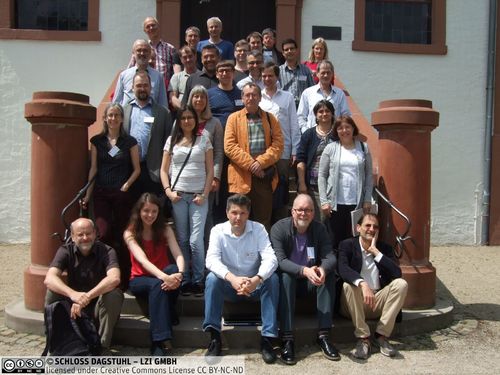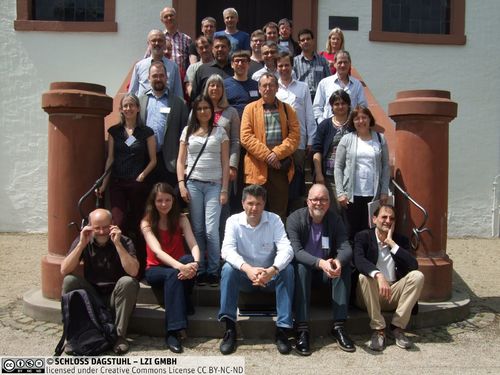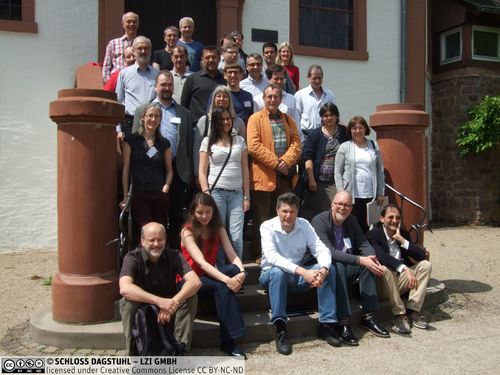Dagstuhl Seminar 15221
Multi-disciplinary Approaches to Reasoning with Imperfect Information and Knowledge – a Synthesis and a Roadmap of Challenges
( May 25 – May 29, 2015 )
Permalink
Organizers
- Igor Douven (Paris-Sorbonne University, FR)
- Gabriele Kern-Isberner (TU Dortmund, DE)
- Markus Knauff (Universität Gießen, DE)
- Henri Prade (Paul Sabatier University - Toulouse, FR)
Contact
- Annette Beyer (for administrative matters)
Impacts
- Normative and descriptive rationality : from nature to artifice and back : article - Besold, Tarek R.; Uckelman, Sara L. - London : Taylor & Francis, 2018. - pp. 331-344 - (Journal of experimental and theoretical artificial intelligence ; 30. 2018, 2).
- Reasoning with Imperfect Information and Knowledge : Special Issue : pp. 1-257 - Kern-Isberner, Gabriele; Douven, Igor; Knauff, Markus; Prade, Henri - Berlin : Springer, 2017 - (Minds and Machines : 27. 2017, 1).
- Skeptical Inference Based on C-Representations and Its Characterization as a Constraint Satisfaction Problem : article in LNCS 9616 : pp. 65-82 - Beierle, Christoph; Eichhorn, Christian; Kern-Isberner, Gabriele - Berlin : Springer, 2016 - (Lecture notes in computer science ; 9616 : article).
Schedule
To date, the field of knowledge representation has seen a huge amount of research work for methodologies that overcome the limitations of classical logical approaches for helping users or intelligent agents to reach promising and successful decisions in uncertain situations. Many approaches can be very roughly subsumed by the terms non-monotonic reasoning and belief revision. Both fields make heavy use of rationality postulates to describe the quality of approaches. Indeed, several phenomena of human reasoning have been investigated but named and dealt with differently in logic, philosphy, and psychology. Now, there is a clear need for crossing borders, combining different frameworks and paradigms, taking cognitive aspects into account, and generally intensifying interdisciplinary work with researchers from psychology, philosophy and other disciplines which study human reasoning and behaviour.
This seminar will address typical problems that smart and intelligent systems in real-world scenarios have to deal with both from formal and empirical points of view. Such systems have to face, in particular, the problem of reasoning with uncertain, imprecise, incomplete, or inconsistent (in short, imperfect) informationwhich often renders more classical, i.e., strict or deductive methods obsolete or fallacious. Reasoning with imperfect information plays a central role in practical deliberation and rational decision making. Models of human context-dependent reasoning that synthesizes logical, philosophical and psychological aspects would be helpful for designing better systems. In psychology, an increasing interest in new formal methods for rational human reasoning under uncertainty can be observed, and on the other hand, philosophers and computer scientists have shown an increased attention to the experimental methods of psychology recently. In particular for computer scientists and AI researchers, it is becoming more and more interesting to see whether the systems they have been developing are materially adequate. A synthesis of rational reasoning with imperfect information that takes into account research done in artificial intelligence, but also in psychology and philosophy is needed for providing a clearer view of where we are and what are the pending issues both from computational resp. logical and cognitive viewpoints. It will help making intelligent systems more effective, and more helpful for their human users.
The aim of this seminar is to bring together researchers interested in rational and uncertain reasoning from a very broad scientific scope to present and discuss problems and approaches from different disciplines, consolidate common grounds, and initiate new interdisciplinary collaborations. Challenges for new paradigms of rational reasoning shall be identified, and visions and foci for more interdisciplinary work shall be developed. There is much more collaboration and open-mindedness among the communities now than there was ten years ago. Indeed, it is for the first time that computer scientists, philosophers, and psychologists are working in a common methodological paradigm with overlapping goals, converging interests, and largely shared research tools. The seminar aims to capitalize on these developments and to provide a deeper and more coherent understanding of reasoning with imperfect information than is currently available. Dagstuhl is a beautifully located venue that is specialized in hosting seminars in computer science and relatedfields. Our seminar will start with tutorials on central topics and will leave ample room for discussions and collaborative work.
This multi-disciplinary seminar with attendees from computer science, philosophy, and psychology addressed typical problems that smart and intelligent systems in real-world scenarios have to deal with both from formal and empirical points of view. Such systems have to face, in particular, the problem of reasoning with uncertain, imprecise, incomplete, or inconsistent (in short, imperfect) information which often renders more classical, i.e., strict or deductive methods obsolete or fallacious. Reasoning with imperfect information plays a central role in practical deliberation and rational decision making. Models of human context-dependent reasoning that synthesise logical, philosophical and psychological aspects would be helpful for designing better systems. In psychology, an increasing interest in new formal methods for rational human reasoning under uncertainty can be observed, and on the other hand, philosophers and computer scientists have shown an increased attention to the experimental methods of psychology recently. In particular for computer scientists and AI researchers, it is becoming more and more interesting to see whether the systems they have been developing are materially adequate. A synthesis of rational reasoning with imperfect information that takes into account research done in artificial intelligence, but also in psychology and philosophy is needed for providing a clearer view of where we are and what are the pending issues both from computational resp. logical and cognitive viewpoints. This will help making intelligent systems more effective, and more helpful for their human users.
This seminar brought together researchers interested in rational and uncertain reasoning from a very broad scientific scope to present and discuss problems and approaches from different disciplines, consolidate common grounds, and initiate new interdisciplinary collaborations. The seminar took profit from the fact that computer scientists, philosophers, and psychologists have started quite recently to work in a common methodological paradigm with overlapping goals, converging interests, and largely shared research tools. The attendees identified challenges for new paradigms of rational reasoning, and discussed visions and foci for more interdisciplinary work.
The first day, the seminar started with (invited) survey talks on central cross-field topics, where each topic was addressed by two researchers from different disciplines:
- Nonmonotonic reasoning and change of knowledge and beliefs
Marco Ragni (CS/Psy), Hans Rott (Phil) - Uncertain reasoning and decision theory
Wolfgang Spohn (Phil), Henri Prade (CS) - Argumentation and reasoning under inconsistency
Ofer Arieli (CS), Ulrike Hahn (Psy) - General forms of human reasoning (e.g., analogical reasoning, interpolation,
and extrapolation, case-based reasoning)
Vittorio Girotto (Psy), Steven Schockaert (CS)
The schedule for the next days included both sessions where attendees could present and discuss their work with the audience, and time slots for discussion groups. The topics of the discussion groups were discussed in a plenary session, and four groups came out of that:
- Topics of group 1: Philosophers' and psychologists' view on human reasoning, and what computer scientists can contribute to that; axiomatic systems vs. psychological models -- how do they fit?
- Topics of group 2: Empirical implications of formal reasoning systems and vice versa
- Topics of group 3: Combination/mixture of reasoning methods, qualitative vs. quantitative approaches; formal axiomatic systems are suitable for decision making(?)
- Topics of group 4: Promises and problems of probability theory; reliability, coherence, higher order probabilities
Groups 1 and 2 joined after the first session due to the closeness of the discussed topics. On Friday morning, the results of the working groups were presented, and a final, lively discussion in the plenary session closed the seminar.
 Igor Douven, Gabriele Kern-Isberner, Markus Knauff, and Henri Prade
Igor Douven, Gabriele Kern-Isberner, Markus Knauff, and Henri Prade
- Ofer Arieli (Academic College of Tel Aviv, IL) [dblp]
- Florence Bannay-Dupin de St-Cyr (Paul Sabatier University - Toulouse, FR) [dblp]
- Christoph Beierle (FernUniversität in Hagen, DE) [dblp]
- Tarek Richard Besold (Universität Osnabrück, DE) [dblp]
- Nicole Cruz de Echeverria Loebell (University of London, GB)
- Igor Douven (Paris-Sorbonne University, FR) [dblp]
- Christian Eichhorn (TU Dortmund, DE) [dblp]
- Thomas Eiter (TU Wien, AT) [dblp]
- Lupita Estefania Gazzo Castaneda (Universität Gießen, DE)
- Vittorio Girotto (University of Venezia, IT) [dblp]
- Ulrike Hahn (University of London, GB) [dblp]
- Stephan Hartmann (LMU München, DE) [dblp]
- Andreas Herzig (Paul Sabatier University - Toulouse, FR) [dblp]
- Anthony Hunter (University College London, GB) [dblp]
- Gabriele Kern-Isberner (TU Dortmund, DE) [dblp]
- Markus Knauff (Universität Gießen, DE) [dblp]
- Karolina Krzyzanowska (LMU München, DE) [dblp]
- Henry Markovits (University of Montreal, CA) [dblp]
- Odile Papini (University of Marseille, FR) [dblp]
- Niki Pfeifer (LMU München, DE) [dblp]
- Henri Prade (Paul Sabatier University - Toulouse, FR) [dblp]
- Marco Ragni (Universität Freiburg, DE) [dblp]
- Hans Rott (Universität Regensburg, DE) [dblp]
- Steven Schockaert (Cardiff University, GB) [dblp]
- Henrik Singmann (Universität Zürich, CH) [dblp]
- Wolfgang Spohn (Universität Konstanz, DE) [dblp]
- Sara L. Uckelman (Durham University, GB) [dblp]
- Matthias Unterhuber (LMU München, DE) [dblp]
- Hans Van Ditmarsch (LORIA - Nancy, FR) [dblp]
- Momme von Sydow (Universität Heidelberg, DE) [dblp]
- Emil Weydert (University of Luxembourg, LU) [dblp]
- Gregory Wheeler (LMU München, DE) [dblp]
Classification
- artificial intelligence / robotics
- semantics / formal methods
- verification / logic
Keywords
- uncertain reasoning
- conditionals
- non-monotonic logics
- belief revision
- similarity-based reasoning
- semantical frameworks
- formal epistemology
- philosophy of probability
- cognitive aspects of rational reasoning
- empirical studies on rational areas




 Creative Commons BY 3.0 Unported license
Creative Commons BY 3.0 Unported license
